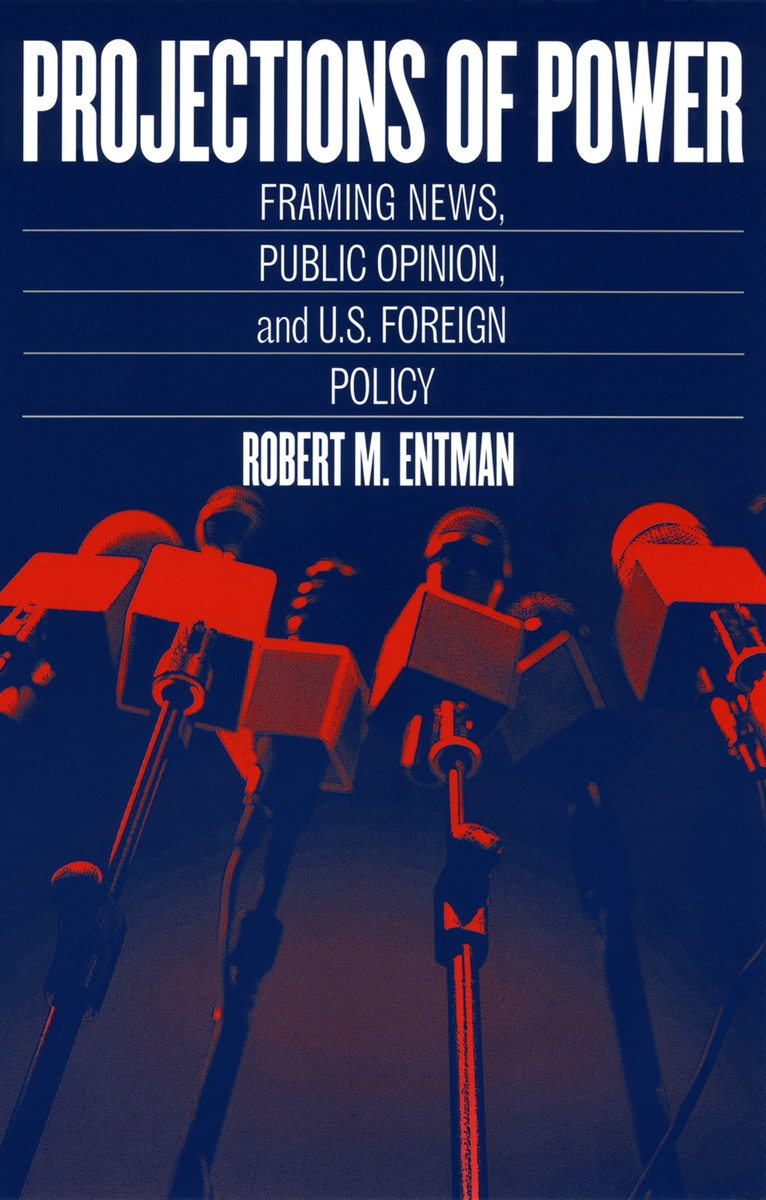Projections of Power
Framing News, Public Opinion, and U.S. Foreign Policy
University of Chicago Press, 2003
Cloth: 978-0-226-21071-1 | Paper: 978-0-226-21072-8 | Electronic: 978-0-226-21073-5
DOI: 10.7208/chicago/9780226210735.001.0001
Cloth: 978-0-226-21071-1 | Paper: 978-0-226-21072-8 | Electronic: 978-0-226-21073-5
DOI: 10.7208/chicago/9780226210735.001.0001
AVAILABLE FROM
University of Chicago Press (paper, ebook)Amazon Kindle (PDF)
Apple Books
Barnes & Noble Nook
Brytewave (CafeScribe-Follett Higher Ed)
Chegg Inc
Copia Interactive
ebrary
EBSCO eBooks (formerly NetLibrary)
Google Play
Kno
ABOUT THIS BOOKAUTHOR BIOGRAPHYTABLE OF CONTENTS
ABOUT THIS BOOK
To succeed in foreign policy, U.S. presidents have to sell their versions or framings of political events to the news media and to the public. But since the end of the Cold War, journalists have increasingly resisted presidential views, even offering their own spin on events. What, then, determines whether the media will accept or reject the White House perspective? And what consequences does this new media environment have for policymaking and public opinion?
To answer these questions, Robert M. Entman develops a powerful new model of how media framing works—a model that allows him to explain why the media cheered American victories over small-time dictators in Grenada and Panama but barely noticed the success of far more difficult missions in Haiti and Kosovo. Discussing the practical implications of his model, Entman also suggests ways to more effectively encourage the exchange of ideas between the government and the media and between the media and the public. His book will be an essential guide for political scientists, students of the media, and anyone interested in the increasingly influential role of the media in foreign policy.
To answer these questions, Robert M. Entman develops a powerful new model of how media framing works—a model that allows him to explain why the media cheered American victories over small-time dictators in Grenada and Panama but barely noticed the success of far more difficult missions in Haiti and Kosovo. Discussing the practical implications of his model, Entman also suggests ways to more effectively encourage the exchange of ideas between the government and the media and between the media and the public. His book will be an essential guide for political scientists, students of the media, and anyone interested in the increasingly influential role of the media in foreign policy.
AUTHOR BIOGRAPHY
Robert M. Entman is a professor of communication and political science at North Carolina State University. He is coauthor of The Black Image in the White Mind: Media and Race in America, published by the University of Chicago Press and winner of the Goldsmith Book Prize and other awards.
TABLE OF CONTENTS
Acknowledgments
Chapter 1: Projecting Power in the News
Appendix to Chapter 1
Chapter 2: Guilt and Innocence in the Korean Airline and Iran Air Tragedies
Chapter 3: Supporting and Opposing Projections of Power: Grenada, Libya, and Panama
Chapter 4: Debating War against Iraq
Chapter 5: Independent Framing and the Growth of Media Power since the Cold War
Chapter 6: Representing the Public’s Opinions in Foreign Policy
Appendix to Chapter 6
Chapter 7: Diversifying the Cascade of Ideas
Notes
References
Index
